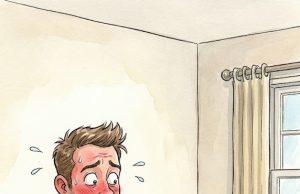
Bathing at the wrong time or in the wrong way can—under certain conditions—raise the risk of a stroke, especially for older adults or people with underlying health issues (like high blood pressure, heart disease, or poor circulation).
Here are key times and situations to avoid bathing to reduce stroke risk:
1. Right After Waking Up
Why to avoid it: Your blood pressure is naturally higher in the morning, and a sudden temperature change (especially cold water) can cause blood vessels to constrict, increasing stroke risk.
Tip: Wait 30–60 minutes after waking. Warm up your body gently before showering.
2. Immediately After Eating

Why to avoid it: Bathing right after meals can redirect blood flow to the skin for temperature regulation, reducing blood supply to the brain and digestive system. This may increase dizziness or fainting risk.
Tip: Wait at least 1–2 hours after eating before taking a bath.
3. When You’re Extremely Tired or Weak
Why to avoid it: Fatigue can lower blood pressure. Standing in a hot shower or getting into a hot bath could cause sudden drops in blood pressure and blood flow to the brain, potentially triggering a fainting spell or stroke in vulnerable people.
Tip: Rest and hydrate first. If bathing is necessary, use warm (not hot) water and have someone nearby if you’re unwell.
4. Very Late at Night

Why to avoid it: Body temperature naturally drops at night to prepare for sleep. Bathing in cold water late at night can cause a temperature shock, especially in elderly individuals, possibly affecting heart function and circulation.
Tip: If you must bathe at night, keep the water warm and the bathroom temperature comfortable.
5. In Very Cold or Very Hot Water
Why to avoid it: Extreme temperatures stress your circulatory system. Hot water can cause blood vessels to dilate too much, leading to dizziness or fainting. Cold water can cause sudden constriction, spiking blood pressure and increasing stroke risk.
Tip: Use lukewarm water—especially if you’re older or have heart or blood pressure issues.
More Tips to Bathe Safely:
Hydrate before bathing.
Keep the bathroom warm to prevent body temperature shock.
Don’t lock the door if you’re alone and unwell.
Sit down if you feel weak or lightheaded.

















